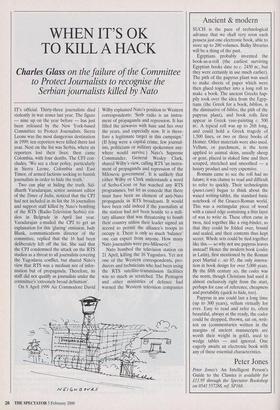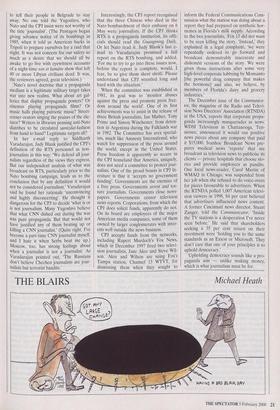WHEN IT'S OK TO KILL A HACK
Charles Glass on the failure of the Committee
to Protect Journalists to recognise the Serbian journalists killed by Nato
IT's official. Thirty-three journalists died violently in war zones last year. The figure — nine up on the year before — has just been released by the New York-based Committee to Protect Journalists. Sierra Leone was the most dangerous destination in 1999: ten reporters were killed there last year. Next on the list was Serbia, where six reporters lost their lives; then came Colombia, with four deaths. The CPJ con- cludes, 'We see a clear policy, particularly in Sierra Leone, Colombia and East Timor, of armed factions seeking to banish journalists in order to hide the truth.'
Two can play at hiding the truth. Sid- dharth Varadarajan, senior assistant editor of the Times of India, noticed that the CPJ had not included in its list the 16 journalists and support staff killed by Nato's bombing of the RTS (Radio-Television Serbia) stu- dios in Belgrade in April last year. Varadarajan e-mailed the CPJ to get an explanation for this 'glaring' omission. Judy Blank, communications director of the committee, replied that the 16 had been deliberately left off the list. She said that the CPJ condemned the attack on the RTS studios as a threat to all journalists covering the Yugoslavia conflict, but shared Nato's view that RTS was a medium not of infor- mation but of propaganda. Therefore, its staff did not qualify as journalists under the committee's 'extremely broad definition'.
On 8 April 1999 Air Commodore David Wilby explained Nato's position to Western correspondents: 'Serb radio is an instru- ment of propaganda and repression. It has filled the airwaves with hate and lies over the years, and especially now. It is there- fore a legitimate target in this campaign.' (If lying were a capital crime, few journal- ists, politicians or military spokesmen any- where would survive.) Nato's Supreme Commander, General Wesley Clark, shared Wilby's view, calling RTS 'an instru- ment of propaganda and repression of the Milosevic government'. It is unlikely that either Wilby or Clark understands a word of Serbo-Croat or has watched any RTS programmes, but let us concede that there must have been an element of anti-Nato propaganda in RTS broadcasts. It would have been odd indeed if the journalists at the station had not been hostile to a mili- tary alliance that was threatening to bomb their country unless their leader signed an accord to permit the alliance's troops to occupy it. There is only so much 'balance' one can expect from anyone. How many Nato journalists were pro-Milosevic?
Nato bombed the television station on 21 April, killing the 16 Yugoslays. Yet not one of the Western correspondents, pro- ducers and technicians who had been using the RTS satellite-transmission facilities was so much as scratched. The Pentagon and other ministries of defence had warned the Western television companies to tell their people in Belgrade to stay away. No one told the Yugoslays, who Nato and the CPJ insist were not worthy of the title 'journalist'. (The Pentagon began giving advance notice of its bombings in 1985, when it told us American hacks in Tripoli to prepare ourselves for a raid that night. It was not concern for our safety so much as a desire that we should all be awake to go live with eyewitness accounts of a night-time son et lumMre show that left 40 or more Libyan civilians dead. It was, the reviewers agreed, great television.) Nato's novel doctrine that a propaganda medium is a legitimate military target takes war into new realms. What about art gal- leries that display propaganda posters? Or cinemas playing propaganda films? Or music halls playing patriotic music? Street- corner orators singing the praises of the dic- tator? Writers in libraries penning anti-Nato diatribes to be circulated samizdat-fashion from hand to hand? Legitimate targets all?
In her e-mail reply to Siddharth Varadarajan, Judy Blank justified the CPJ's definition of the RTS personnel as non- Journalists in this way: 'We defend all jour- nalists regardless of the views they express. But our independent analysis of what was broadcast on RTS, particularly prior to the Nato bombing campaign, leads us to the conclusion that by any definition it would not be considered journalism.' Varadarajan said he found her rationale 'unconvincing and highly disconcerting'. He thought it dangerous for the CPJ to decide 'what is or is not journalism. Many Yugoslays believe that what CNN dished out during the war was pure propaganda. But that would not have justified any of them beating up or killing a CNN journalist.' (Quite right. I've become a part-time CNN journalist myself, and I hate it when Serbs beat me up.) Moscow, too, has strong feelings about when a journalist is not a journalist. As Varadarajan pointed out, The Russians don't believe Chechen journalists are jour- nalists but terrorist bandits.'
Interestingly, the CPJ report recognised that the three Chinese who died in the Nato bombardment of their embassy on 8 May were journalists. If the CPJ thinks RTS is a propaganda institution, its offi- cials should read the Guangming Daily. Or let Nato read it. Judy Blank's last e- mail to Varadarajan promised a full report on the RTS bombing, and added, 'For me to try to go into these issues now, before the report is complete, would, I fear, be to give them short shrift. Please understand that CPJ wrestled long and hard with the situation.'
When the committee was established in 1981, its goal was to 'monitor abuses against the press and promote press free- dom around the world'. One of its first achievements was to assist in the release of three British journalists, Ian Mather, Tony Prime and Simon Winchester, from deten- tion in Argentina during the Falklands war in 1982. The Committee has area special- ists, much like Amnesty International, who watch for suppression of the press around the world, except in the United States. Press freedom is apparently so secure in the CPJ homeland that America, uniquely, does not need a committee to protect jour- nalists. One of the proud boasts in CPJ lit- erature is that it 'accepts no government funding'. Governments are the enemies of a free press. Governments arrest and tor- ture journalists. Governments close news- papers. Governments censor television news reports. Corporations, from which the CPJ does solicit funds, apparently do not. On its board are employees of the major American media companies, some of them owned by larger conglomerates with inter- ests well outside the news business.
CPJ accepts funds from the networks, including Rupert Murdoch's Fox News, which in December 1997 fired two televi- sion journalists, Jane Akre and Steve Wil- son. Akre and Wilson are suing Fox's Tampa station, Channel 13 WTVT, for dismissing them when they sought to
inform the Federal Communications Com- mission what the station was doing about a report they had prepared on synthetic hor- mones in Florida's milk supply. According to the two journalists, Fox 13 did not want to be seen killing the story. 'Instead,' they explained in a legal complaint, 'we were repeatedly ordered to go . forward and broadcast demonstrably inaccurate and dishonest versions of the story. We were given those instructions after some very high-level corporate lobbying by Monsanto [the powerful drug company that makes the hormone] and also, we believe, by members of Florida's dairy and grocery industries.'
The December issue of the Communica- tor, the magazine of the Radio and Televi- sion News Directors' Association (RTNDA) in the USA, reports that corporate propa- ganda increasingly masquerades as news. WDSI Television in Chattanooga, Ten- nessee, announced it would run positive news pieces about any company that paid it $15,000. Ivanhoe Broadcast News pre- pares medical news 'reports' that are broadcast as television news to publicise its clients — private hospitals that choose sto- ries and provide employees as pundits. One local news-reader, Carol Martin of WMAQ in Chicago, was suspended from her job when she refused to do voice-overs for pieces favourable to advertisers. When the RTNDA polled 1,007 American televi- sion viewers in 1998, 84 per cent believed that advertisers influenced news content. A former Cincinnati news director, Stuart Zanger, told the Communicator, 'Inside the TV stations is a desperation I've never seen before.' He said that shareholders seeking a 35 per cent return on their investment were 'holding you to the same standards as an Exxon or Microsoft. They don't care that one of your principles is to uphold democracy.'
Upholding democracy sounds like a pro- paganda aim — unlike making money, which is what journalism must be for.



























































 Previous page
Previous page